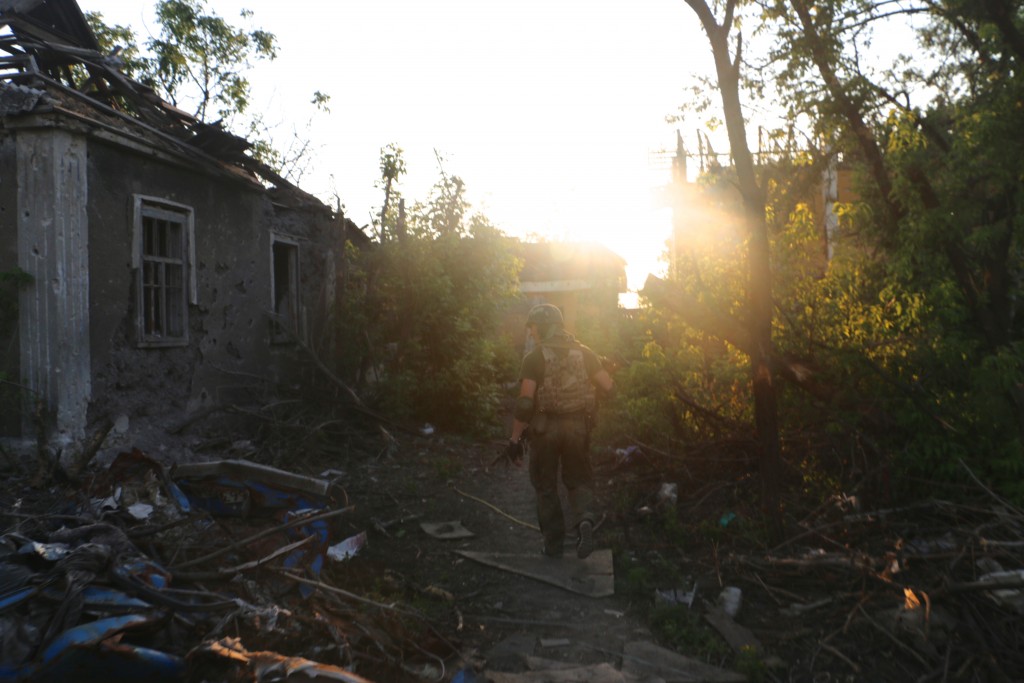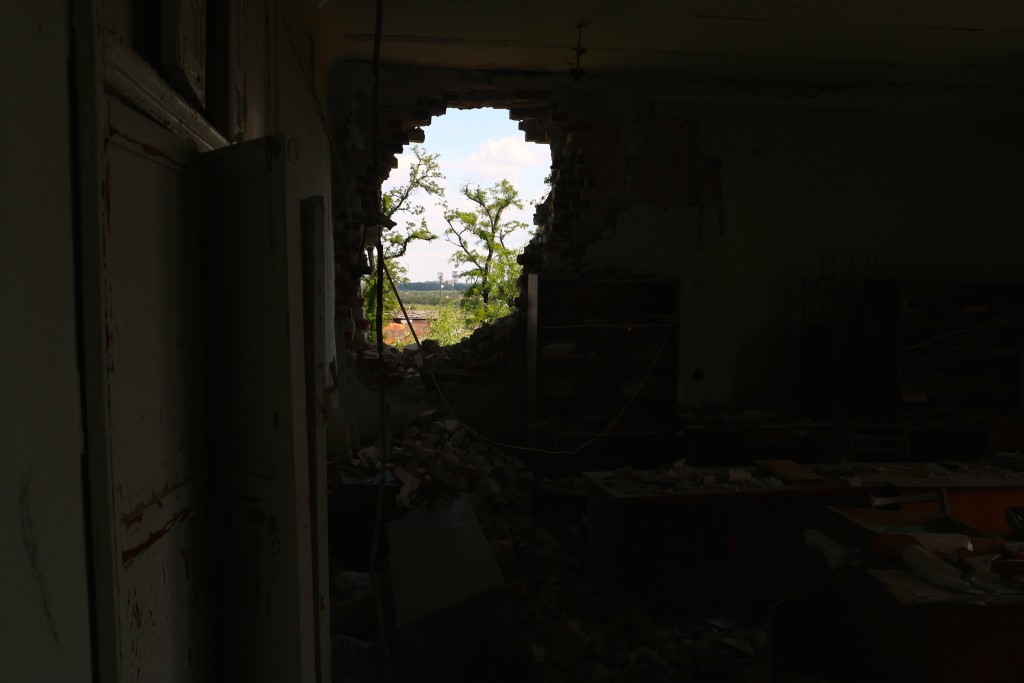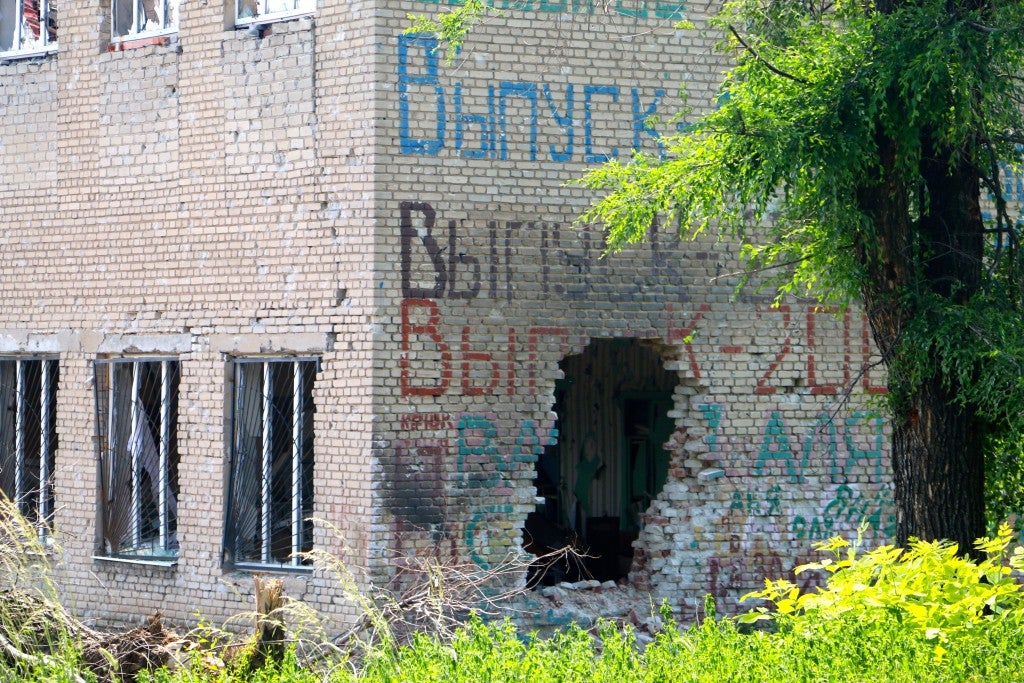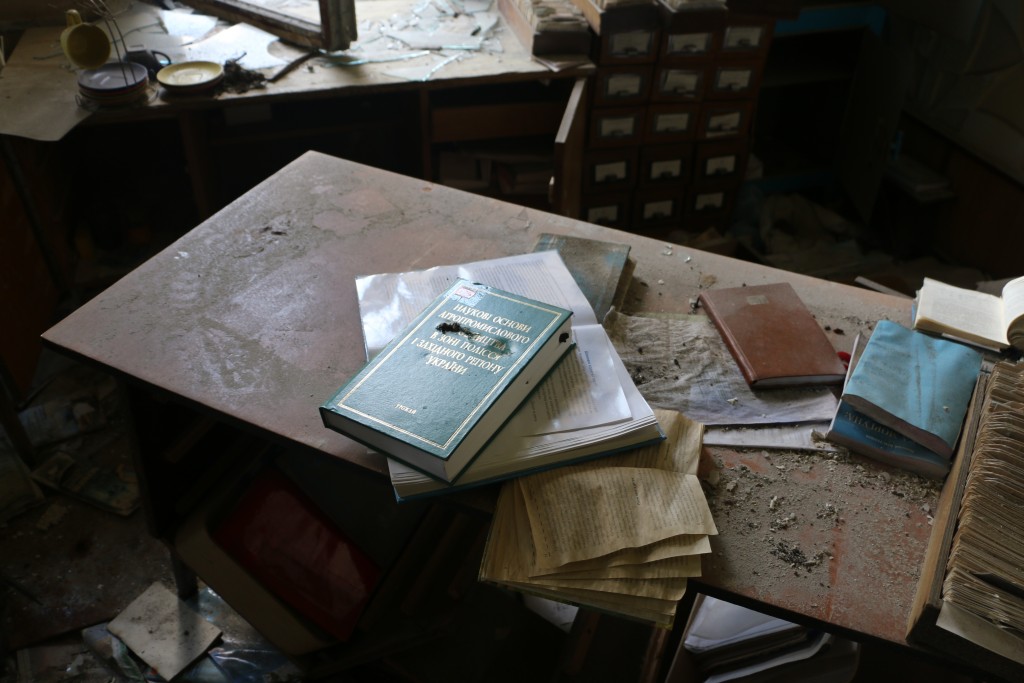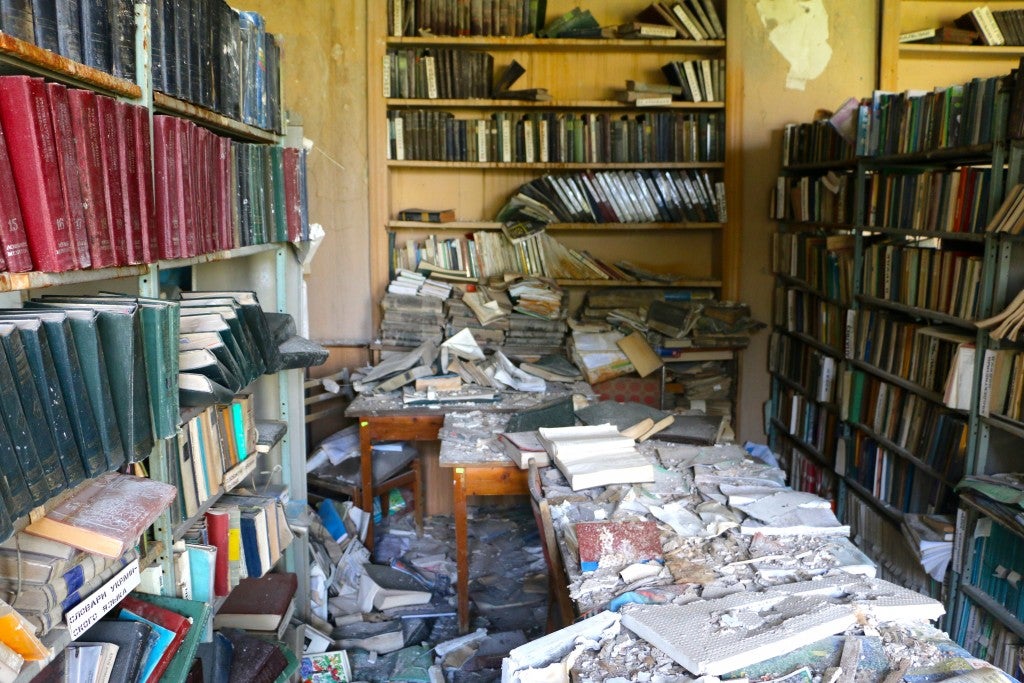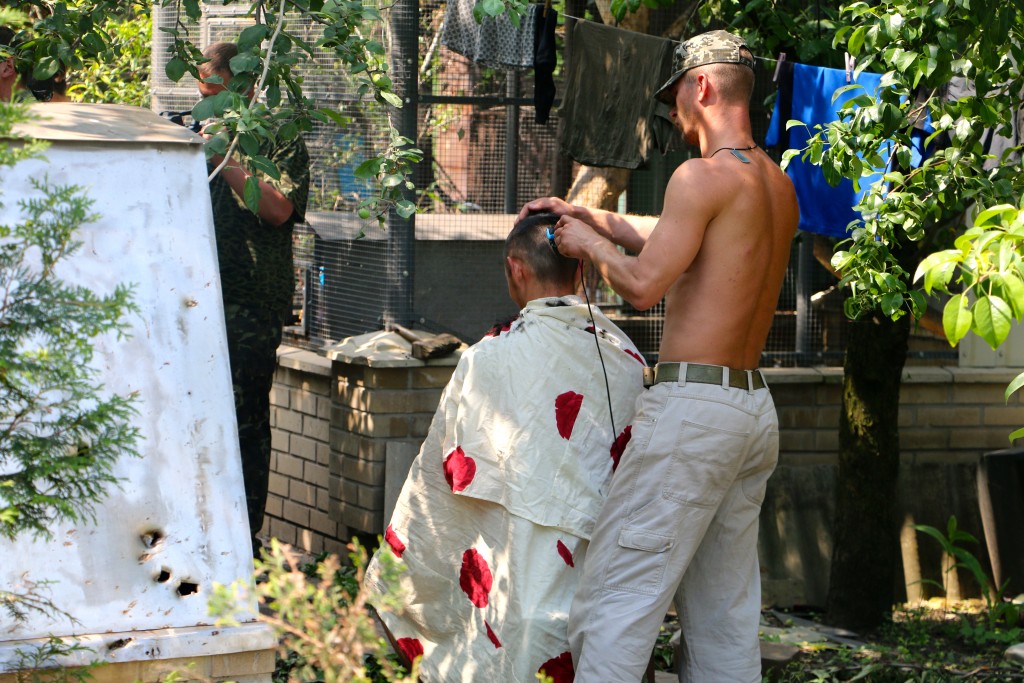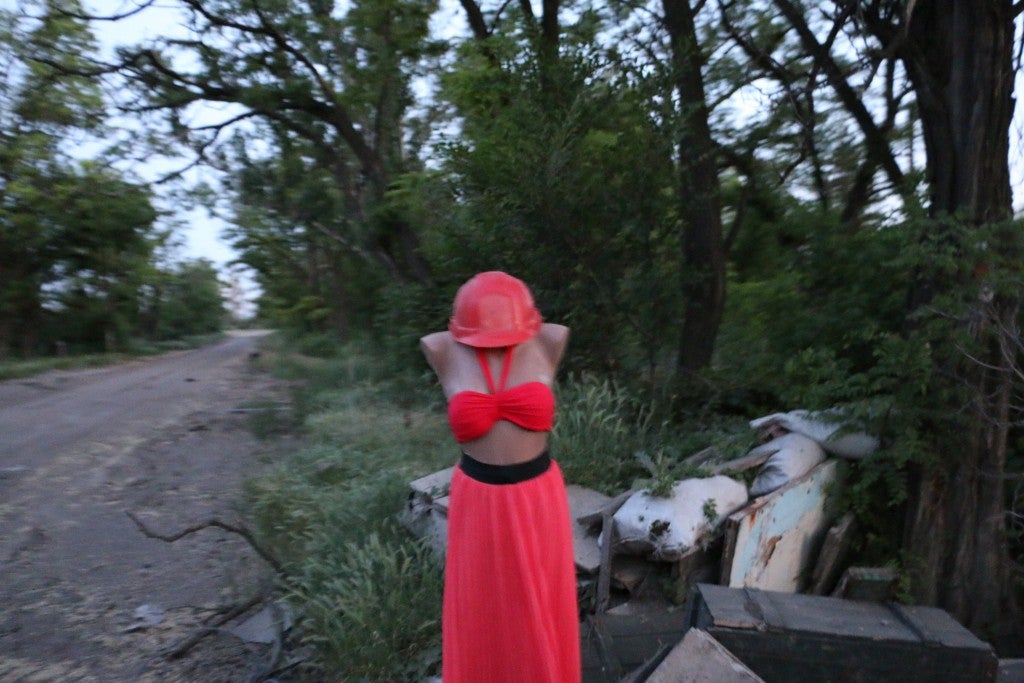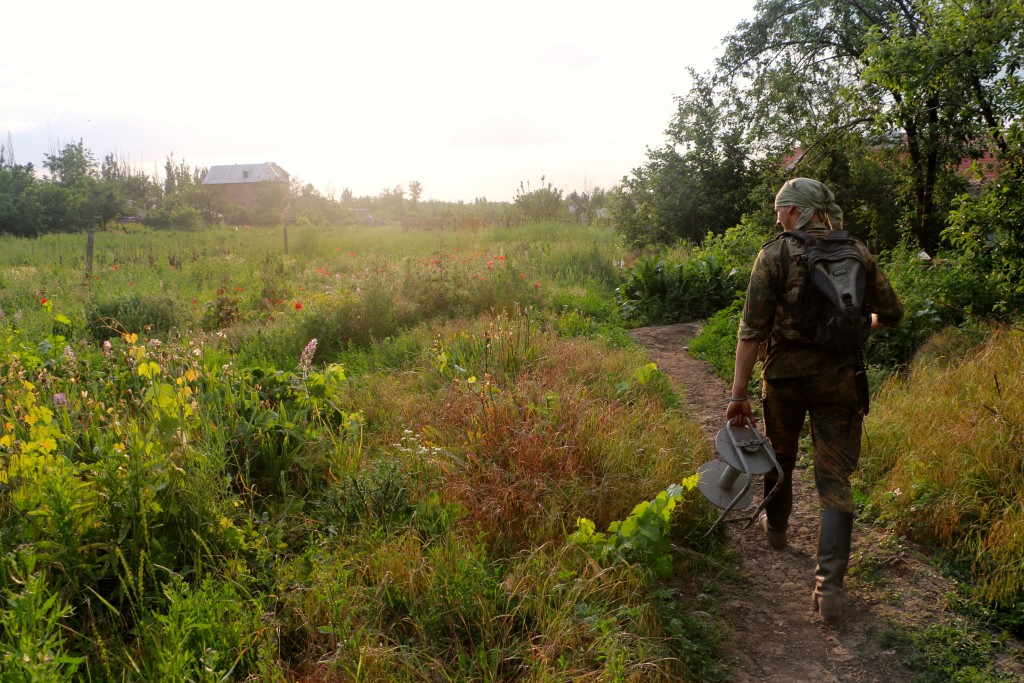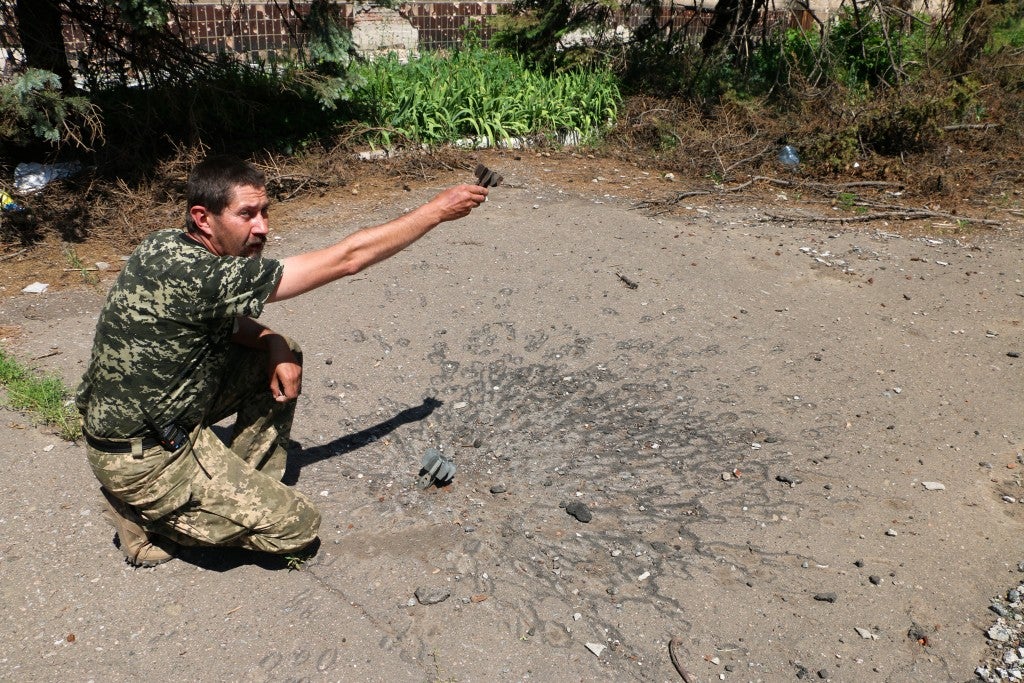The Flash, the Boom, and the Dark: 8 Days on the Front Line of the Ukraine War
Nolan Peterson /
PISKY, Ukraine—There are a lot of ways to die in Pisky, and they all come down to seconds and inches.
Snipers, artillery, mortars, booby-traps. That’s the worst part of this war. You just never know when it’s going to happen.
Seconds and inches. Fifty more years and the long road ahead, or the flash and the boom and the dark now nothing.
And yet, you go on living out of habit. You get used to the explosions and the gunfire—it’s amazing, really, what humans can get used to. You let your guard down. You stand outside for some sun and to drink your morning coffee.
In sandals and a tank top you walk the 100 yards from the cellar, in which you and the soldiers hide from the artillery, to the outhouse and the toilet. During the day, you walk through the ruined town on patrol, spending hours outside, to get an interview or for some photos or video. But in your mind you’re always ready for it to start. And you’re always worried that you might get it.
The artillery is a constant worry, but the snipers inspire a different kind of fear. When a sniper shoots at you it’s personal. Unlike the arbitrariness of an artillery attack, you know there is a human being looking at you through a scope trying to kill you. And you can’t do anything to fight back. All you can do is run and hope and listen to the whistle of bullets flying past.
There were five of us standing in the courtyard of a farmhouse. We were relaxed. Volodymyr—a sniper who quit his job at an Obolon beer factory to volunteer for the war—and I had just come back from the trenches. We still had our body armor on, but I had taken off my helmet. Two 120-mm artillery shells had fallen on the path we had taken back, one minute behind us.
One minute. A few more sips of water. Or maybe that question I forgot to ask during an interview. One minute. Life. Death. Those are the things you try to not think about in a war zone.
And so we laughed about the close call without truly thinking about it. The sun was getting low on the horizon, and the colors of the green fields, yellow sunflowers, and purple lavender were popping and glowing in that airbrushed end-of-day way.
That’s how we were and what I remember when the first bullet zipped overhead. zzzOOOooo… Like a fingernail dragging across stretched nylon. We were standing and then we were flat on the ground instantly, like a jump cut in a film. You go straight from the now to the remembering.
I looked to Volodymyr. “Sniper,” he said, singing the “i” in his Ukrainian accent. The fact that he, a sniper, was sprawled on the ground said something. After a few moments, we slowly, one by one, stood up. I put my helmet back on.
zzzOOOooo…
Another shot. We were all on the ground again. “He’s close,” Volodymyr said. The far-off sounds of artillery, which hardly ever stop in Pisky, grew louder. The occasional machine gun bursts from the trenches, which were as habitual as the artillery, became steadier. It was like the different sections of an orchestra joining in as a symphony builds. A battle was on.
We were standing up again when Vasiliy, Oleksiy and Daniel burst in the courtyard. Vasiliy, compact, wiry, and grey-headed from his 53 years, was agitated. He spoke loudly and angrily in Ukrainian. He had come looking for Volodymyr and me, knowing the path we had taken had been shelled. Daniel, a soft-spoken 19-year-old from Zaporizhia, explained in English that a sniper’s bullet went through the windshield of the car Vasiliy drove over here. He missed death by inches.
zzzOOOooo…
Another bullet whizzed overhead. Everyone hit the ground again. Vasiliy landed next to me, trying to conceal me with his body. He spoke no English, and I spoke no Ukrainian. But he had a protective instinct for me. He called me “Amerika,” and always magically appeared by my side when the shooting started, as it did frequently.
Before we could stand up, the artillery started. There’s no opening statement to an artillery barrage, no sportsmanlike “game on” from the other side. Maybe you get lucky and hear the radio call from the Ukrainian spotters in the trenches, announcing that artillery is coming in, and you have enough time to get to a cellar. But it’s usually just the hard cracking blast of that first shell and the knowledge that more is to come. Like the first drop of rain before the downpour.
When that first blast hit nearby we all scrambled for the entrance to the cellar beneath the farmhouse, which was only a few feet away. You feel completely naked as you make that short run to the doorway and then down the first few steps with your back still exposed to the outside and the hailstorm of shrapnel. Inside and safe, you feel exhilarated and start to laugh. The sounds of artillery falling outside and above come through the earth like bass from a subwoofer.
We waited in the cellar until the shelling let up. This was the hole-up site of another unit, and we didn’t want to be stuck there after dark. So we decided to make a break for the house and the cellar in which we were living, which was about 500 meters away, up the same road on which Vasily had taken the bullet through the windshield earlier.
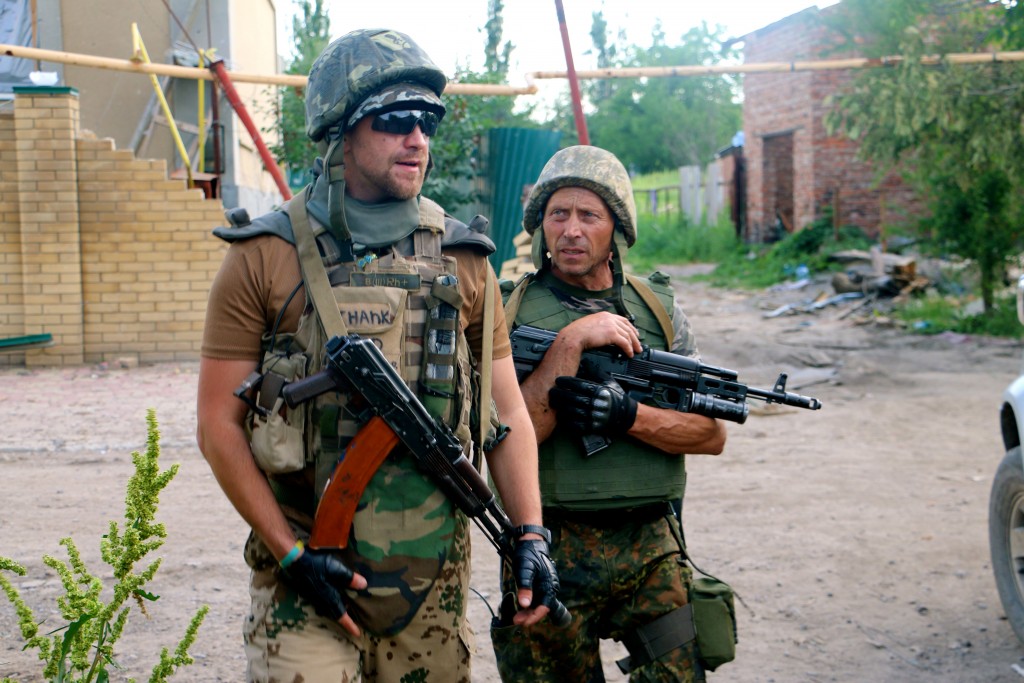
Vasiliy Ivaskiv, 53, (right), and another soldier on patrol in Pisky (Photo: Nolan Peterson/The Daily Signal)
When it was quiet, we left the cellar, moving quickly and efficiently, and by efficiently I mean taking the shortest possible route. We cut through some small gardens and across a field, then through a short stretch of hedgerows. We stayed off the road until there was no other choice.
“Be careful,” Daniel said. “He’ll be shooting at your back.”
We turned our backs to where the sniper was and ran the remaining few hundred meters as fast as we could, hugging the side of the road. The effort of running at a full sprint while wearing body armor was overridden by adrenaline and hope.
My whole world condensed to the spot up the street where I would turn right out of the sniper’s line of sight and into the safety of the courtyard and the entrance to the basement. I pushed, but my legs wouldn’t go any faster. Closer, closer. Not much farther, only a few dozen yards. I heard a bullet zip by and the crack of a sniper shot.
“Amerika,” Vasiliy yelled.
Time and distance
The first time I went to war it was in a U.S. Air Force C-17 cargo plane, which flew halfway around the world with stops in Germany and Qatar. The journey took more than a day. An Army chaplain read the poem Invictus as we spiraled down to a blacked out landing at Bagram Air Base, Afghanistan.
This time it was the 6:25 a.m. express train from Kyiv to Kostyantynivka. I grabbed an Egg McMuffin and coffee from the McDonald’s at the Kyiv train station before boarding. I passed the five-hour train ride listening to Jack Johnson on my iPhone while a young mother sat across from me with her infant child. We arrived in Kostyantynivka, which is the last stop before the war zone, around noon, and two French journalists and I hired a taxi to take us to a lonely Ukrainian army checkpoint.
We sat on a wooden ammo case under a broad oak tree at the intersection, eating fresh cherries the soldiers there had given us as we waited for our ride to the front lines. Through the hedgerow we looked out at the vast Ukrainian sunflower fields, spread yellow like a quilt being shook in the wind, ending distinctly and distantly in the cloudless blue sky. The primary colors and rolling vistas looked like a landscape from a Dr. Seuss book. As we waited there we could hear the far-off sounds of artillery.
When our ride arrived, we began the last leg of our trip and the final transition from peace to war. But it wasn’t easy to tell when that happened exactly. The war’s clues slowly pile up creating a looming feeling of doom, and the vignettes of normal life on the side of the road, which would otherwise seem unremarkable, seem increasingly out of place.
The father (wearing military fatigues) waiting with his daughter for the school bus, a shirtless old man on a bicycle, children swimming in a lake. As you get closer to the war these scenes of normal life shock you more than the checkpoints, soldiers, tanks, machine guns or anti-aircraft missiles. War is about more than armies and their weapons; it is about life interrupted. And that is what you notice most.
Once we arrived in Pisky, we knew we were in the war. The apocalyptic scenes of artillery destruction and the uninterrupted background din of gunfire and artillery affirmed that we had truly arrived.
One of the greatest differences between the Ukraine war and the ones in Iraq and Afghanistan are its boundaries. This is a frontal war, where armies square off in opposing trenches and hole up in destroyed and abandoned buildings for months on end. They stare at each other through binoculars during the day and listen to each other at night, both on the radio and in voices carrying across no man’s land. Iraq and Afghanistan were countries at war, where insurgents and terrorists could pop up anywhere, anytime. But in Ukraine the war is a destination, quarantined from the rest of the country. The war has a physical address and a border—once you’re at it, you’re in it.
My French friends had covered conflicts around the world, including Iraq, Gaza, Libya and Syria. They were pros and taught me a lot over the eight days we spent embedded with the Ukrainian army’s 93rd Brigade in Pisky. Like how to tell the difference between incoming and outgoing artillery. I got better at that while I was in Pisky, but never quite mastered the distinction.
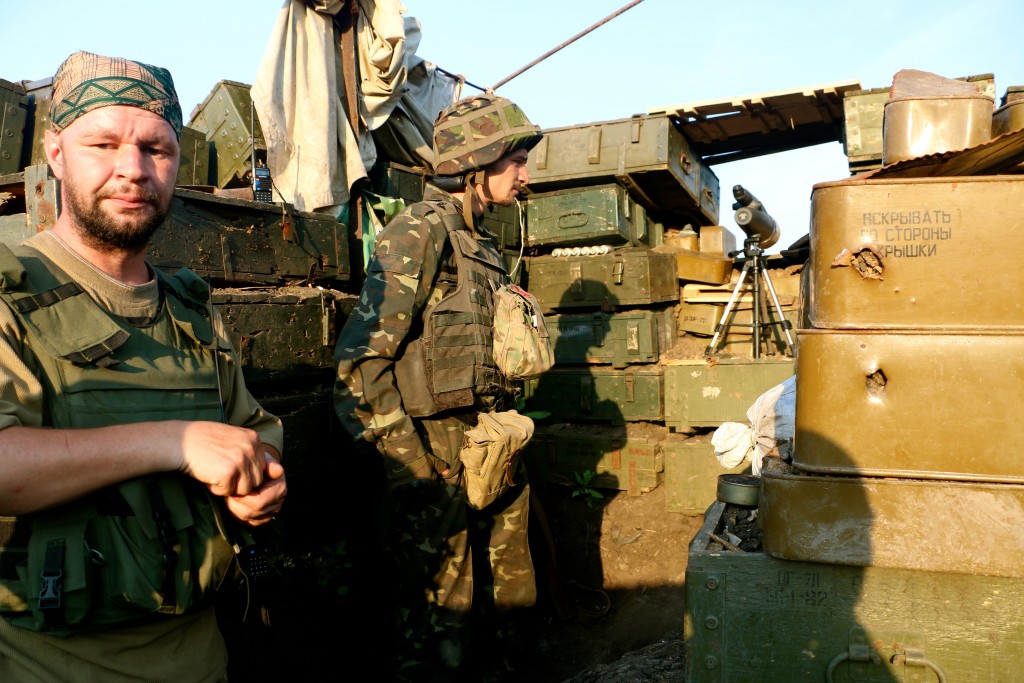
The Ukraine war is frontal war, fought in trenches and with heavy weapons. (Photo: Nolan Peterson/The Daily Signal)
When I was alone on patrol with the Ukrainian soldiers and the artillery thundered, I would ask, “Nashi?” To which the Ukrainian soldiers would almost always shake their heads somberly and reply, “Nyet, separ.”
Some of the Ukrainian soldiers spoke English, but over the eight days I developed a hybrid language with the ones who didn’t, blending Russian, Ukrainian, English, and sign language. Although whale songs include more vocabulary than what we shared, after eight days together we could communicate through hand gestures, intonation, facial expressions, and the words we made up.
We trusted each other absolutely. I trusted them with my life when we visited the trenches or went on patrol or when snipers tried to kill me. And they risked their lives to show me their war. When the firing began they would often crouch beside me protectively, offering their bodies as a shield. I didn’t want this; they had no obligation to protect me, I explained. But they insisted.
Initially, many of the Ukrainian soldiers were standoffish, suspicious even, of my presence on the battlefield. They weren’t used to a foreign journalist living with them 24/7 for days on end, and they didn’t want me out in the trenches or in combat with them.
But like the U.S. soldiers with whom I embedded in Afghanistan, the Ukrainian soldiers trusted me more when they discovered I had been in the military. They trusted that I could handle myself and that I wasn’t there on a photo safari. They trusted me to tell a true war story.
They offered to take me everywhere, including into the thick of things. They were curious about my country and me. We had conversations long into the night, sometimes through the translations of one who could speak English, sometimes in our own improvised tongue, about fear, family, war, democracy, revolution, the beaches in Florida, and what American women were like.
When they asked me what Americans thought about their war, I was honest.
“Most of them don’t think about it very often, if at all,” I said.
“Ya ponimayu,” they would reply.
Finding Nemo
The best example of the Ukrainians’ acceptance of my presence on the battlefield was a soldier named “Nemo.” Nemo was a tall, buzz-cut, muscular recon soldier with gold teeth and a quiet, intense demeanor. He was a former Right Sector fighter who had been living in Pisky for more than five months without a single day of leave.
When Right Sector, a civilian volunteer battalion that emerged from the Euromaidan protests, was incorporated into the regular army, many of its members went home. But Nemo stayed to fight.
At 39, Nemo was one of the older soldiers in the unit. And among the Ukrainian soldiers in Pisky, I saw none who displayed as much calmness as Nemo in times of intense fighting. When others would duck in fear or run for their lives, Nemo moved calmly and casually.
“When I see the younger guys with no experience,” he told me, “I feel like I need to help them. I know that, as an experienced guy, the younger ones watch my behavior and my poise. So I feel that I can help them.”
“But some people just can’t deal with this war,” he added, “and it’s not worth giving away my soul to help them.”
When I first arrived, Nemo was dismissive and distrustful. But he slowly shared his war with me. He showed me a steel tower where, in an earlier battle, he had been trapped on an upper platform about 10 stories high while a tank pummeled the tower with cannon shots. He said he was trapped there for almost a full day, and when he finally descended to the earth he could barely walk because his head was so rattled from the constant concussions.
Standing there with me, Nemo stared silently at the structure, which looked like a giant charred piece of Swiss cheese. His mind was back in some time and place I could never imagine. “Kamikaze,” he said quietly.
For Nemo, the war was home. He constructed a gym in an abandoned shed, and spent every morning, even while the artillery fell, doing dips, pushups, pull-ups, and exercises with an old kettle bell. In the afternoons, when not on patrol, he tended a garden where he grew strawberries.
“It’s impossible in a war zone to think about the war all the time,” he said. “You need to do the same things you did at home. I’m still the same man I was before the war, and I don’t want to change.”
Home
The cellar in which the soldiers shelter from artillery is home, and everything orbits around the dinner table.
Vasiliy, the soldiers called him Vasha, is usually the one cooking. He’s a former miner from the western Ukrainian town of Ivano-Frankivsk and has a 31-year-old son. He heaps food onto soldiers’ plates, insisting that they eat well.
The dinner table is where soldiers clink glasses to celebrate after surviving close calls. It’s where they sit to talk and tell jokes during the really bad artillery attacks. The cellar walls are piled high with boxes of food—crackers and cookies, the beloved chicken cutlets, cucumbers, pasta, eggs—all brought in by civilian volunteers.
The walls of the cellar are the life story of men at war. There are calendars of women in bathing suits hung next to Kalashnikov assault rifles and body armor. Orthodox pictures of the Virgin Mary sit on tables and bookshelves side by side grenades and ammunition. Pictures of home lie next to tourniquets and packets of QuikClot (a hemostatic you pour into wounds to stop bleeding).
At night the soldiers listen to music, a playlist that includes Elvis, Three Days Grace and opera. Some lie in bed alone and scroll through pictures of wives and children. It’s the same photos they’ve looked at thousands of times before, but they never get old. It’s hard to keep in touch with family and friends here. Internet connection is spotty at best, and cell phone calls are all but forbidden because Russian technology can pick out cell signals to better target artillery.

The Ukrainian soldiers use humor to deal with the stress of combat. (Photo: Nolan Peterson/The Daily Signal)
Although the war broke some, it has hardened the spirit of most the Ukrainian soldiers. We were sitting around the table one night after dinner when Daniel came by for a visit. It was dark when he arrived, hours past when he was supposed to have left his post. He had been in a battle that evening, he said, a bad one.
There was sniper and machine-gun fire and artillery falling all around. He wasn’t even able to shoot back, he said, because it was so intense. He could only low-crawl through the trenches to find cover and wait it out. Yet, when describing the battle, he said: “It was really awesome. Really awesome.” He gave a thumbs up and smiled broadly.
He looked tired, though, and when he sat down he chugged several glasses of water and then juice. He filled his plate with food and ate well. He glided easily into the conversation as if he were a 19-year-old just getting home from afternoon sports practice rather than a day of combat.
Daniel had a soft, tanned face, small dark eyes, and patchy young man’s beard, which he had let grow around his neckline and upper lip like many other young Ukrainian soldiers. He wore a cross on his wrist.
He spoke English in a staccato, halting way, sometimes staring off when he was stuck on a word, either because of the translation or because he was explaining an idea that is hard to express in any language. Daniel was unique in his ability to put the toll of the war in context. Even at his age, he already understood the unalterable changes occurring in him. He recognized that he was spending the formative years of his manhood in a place where all that life owed him—years, love, family, career—all those things could disappear any second in a white flash and red heat and dark nothing.
Soldiers such as Daniel escape death by seconds and inches every day. Others get it. Yet, time after time, they survive. You are either one of the lucky ones, or a name that you make a toast to before dinner with a sad shake of the head.
The atheists and the agnostics start to seriously believe that the small talisman in their pocket might have kept them alive. Or maybe it was those pants they haven’t washed for several days—they can’t wash them now, of course. If anyone asks why, they just have to say, “for good luck.”
No one will ever criticize them for that. That is sacred ground, like talk about wives and children. Every time they walk out the door, the soldiers try to repeat, in minute detail, what they did the time before in the hope that those patterns, and not the cold indifference of seconds and inches, were what stood between them and the dark nothing.
Many soldiers are superstitious and carry objects for luck, such as woven angels or photos from home. Some wear crosses around their necks, or bracelets with Orthodox images. Others have a lucky bandana or a T-shirt. Bogdan, a 25-year-old from Lviv who likes riding motorcycles and wearing cowboy hats, avoids taking a photo before he goes out. And he doesn’t say good-bye.
This is a war in which survival is all about the odds, and routine is the only thing you can control. You can die from a sniper’s bullet, or a mortar, or an artillery shell, or a Russian-separatist reconnaissance squad that slipped through the lines at night. You can die on the toilet, taking a shower, standing in the doorway having a cigarette, picking strawberries from a garden. Or you can die in a machine-gun pillbox in the trenches. The war is omnipresent and everlasting. There is no escape except to build an imaginary distance between you and the war every day in your mind, like Nemo with his gym and his garden.
Home is less than a three-hour drive away for many soldiers, yet some haven’t been home in six months. They might as well be on the other side of the planet from their friends and family. And the longer they stay in Pisky, the farther they feel from home and the men they were before the war.
Last laugh
You are in no rush to get out of bed in the morning. You enjoy being in bed in the cool cellar with the warm blankets as you pretend the booms and the gentle vibrations are from a summer thunderstorm in Florida.
There is a loud, high-gain crack, which flows into a longer, ground-shaking boom. You go out and see a burning crater where the shell landed in the courtyard just 30 feet from the entrance to the cellar. And then you have breakfast. You wait a while before walking out of the courtyard, across the street to the outhouse and the shower.
Sitting in the outhouse, the daylight comes in at the random angles of the different shrapnel holes in the wall and door. While pouring a bucket of cold water on yourself in the shower shed, you laugh, thinking how funny it would be if the shelling started right then and you had to run back to the cellar naked and covered in soap suds.
But the shelling doesn’t start until later. And you forget to laugh about it.
The sun was low in the late afternoon of June 13, silhouetting the pollen we kicked up as the seven of us walked through the plots of corn and beet root in the center of Pisky.
We paused every few yards for a photo. Volodymyr found an impact crater of a grenade from one of the automatic grenade launchers the separatists had been firing at our position all day. He put some pieces of shrapnel in my palm. None of us were in body armor or wearing helmets. I was wearing sandals, cargo pants, and a T-shirt. There was hardly any wind to scatter the pollen we kicked up, and it was hot.
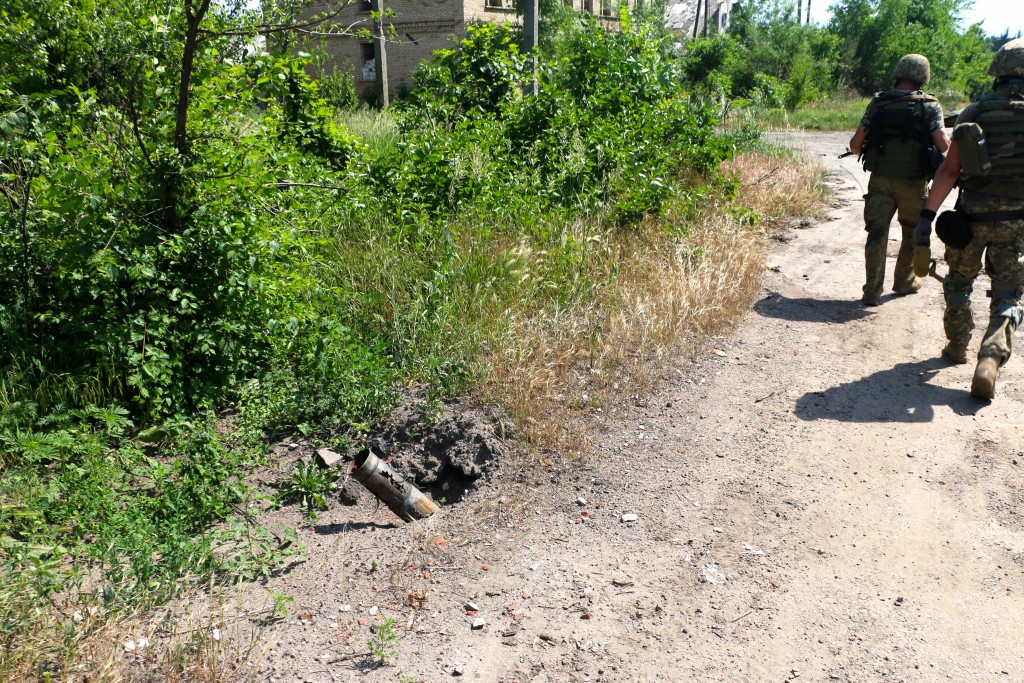
The ground is littered with expended ordinance, including Grad rockets. (Photo: Nolan Peterson/The Daily Signal)
I could feel a few beads of sweat roll down my back and the dirt in between my toes on my sandaled feet. There were birds chirping. I remember that specifically. As we walked, the Ukrainians pointed at different things, such as the budding corn stalks, asking how to pronounce the names in English. We all stood together clustered in one group for a moment, probably for not more than 30 seconds. Something faintly buzzed distantly overhead, stirring us to move.
Volodymyr turned and we started to walk back across the field in the direction of the cellar. We had walked maybe 20 yards when the tank round came.
Tank rounds give you less time to duck than artillery rounds do, their arcs are flatter and you don’t hear the sound of the shell falling for quite as long. It was practically instantaneous.
We heard the laser zap of the round over our heads and then two explosions. I don’t know which was the round exploding and which was the tank cannon firing, but the three sounds were separate and distinct—zip, boom, boom. Without thinking about it, we were all flat on the ground. The round had hit about 60 feet away.
A separatist tank was patrolling around the exterior of the Ukrainian lines and a drone had likely spotted the concentration of people in the field and ordered the tank to fire at our location. It was, in fact, a good shot, landing exactly where we had been a moment before. Our lives spared because we started to walk back in the time it took the drone pilot to relay our coordinates to the tank.
With the tank round came the unthinking. Lay flat on the ground, arms over the head. The two booms, the sounds of shrapnel spraying the nearby sheet metal walls of an equipment shed and the brick wall of a house off to the left. A moment, then up, someone is yelling, “go, go, go.” It’s me in fact.
One thought, the cellar. Safety. Move fast but don’t trip. Stay in control. No worrying about when the next round will come, and it will most surely come. But you don’t think about it. You only run. Head down for snipers while crossing the road. Move steady, don’t trip. Twenty feet, 10 feet, five feet, bursting in the door of the cellar. Is everyone OK?
They come back in one by one, no wounded or dead. Then laughing, high fives, and slaps on the back, everyone telling their own story, comparing. Yes. See? That really happened; that really just happened. No fear, not yet. I hold out my hand, it’s steady. But I’m breathing hard; my heart is pounding. I just ran an all-out sprint for more than 150 yards, hurtling fences, but I only now notice the effort.
And then I remember to see if I’m hurt. I check my arms and legs and my torso. No blood. The feeling hasn’t come back yet. I see the others doing the same. We check each other too. Then, my camera. Did I break it when diving to the ground? No, it’s fine.
My heart starts to slow down, the laughter softens, but I still don’t feel like sitting down. But I want something sweet. I eat a cookie. I’m thirsty and I pour a cup of water, and I see my hands are shaking now, just a little. Outside the tank shots are steady and landing all around us. You know they’re close when you hear the zip of the round flying through the air before impact.
There is an automatic grenade launcher working on our position too. The closer the rounds get, the higher the treble of the explosion. Then the Ukrainians fire back with anti-tank missiles. There is a back and forth for a few minutes. We hear on the radio that the separatist tank has turned back and is fleeing. We cheer, clink glasses, and sit down.
About an hour later, the separatists started on our position again, this time with the long-range artillery, the 152-mm rounds—the really terrifying stuff.
Fear
The louder the artillery, the louder the laughter and joking at the dinner table. As if jokes and laughs were a force field from the dangers outside. We were, in fact, relatively safe from shrapnel in the cellar. A direct hit would be catastrophic, but what can one do? Only wait and distance the mind from the danger by the collective defense of camaraderie.
When the shelling grows louder, you feel a need to be around others. If you’re sleeping in your bunk, perhaps reading or listening to music, and the walls start to shake from artillery, it’s an automatic reaction to get up and walk to the kitchen table where the others are gathered. You sit down, they pour you a drink, you clink glasses. They nod and smile at you, slap you on the back, and then it’s all OK.
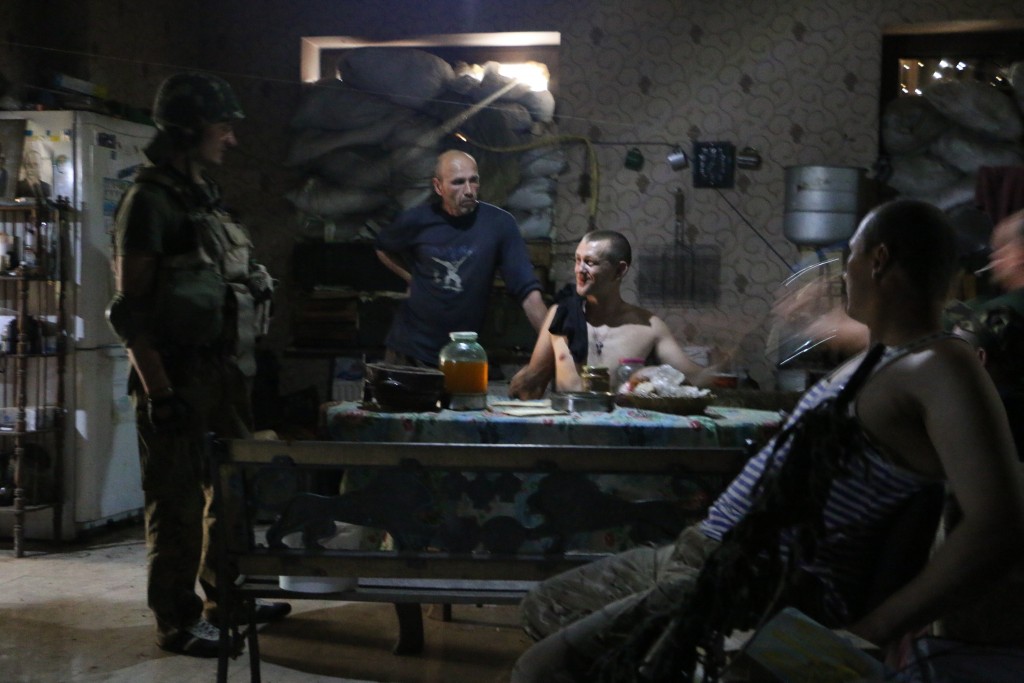
The dinner table is where soldiers gather when sheltering during artillery attacks. (Photo: Nolan Peterson/The Daily Signal)
Your fear clears like an early morning mist in the sun. A warm shiver flows through you from head to toe like a shot of hard alcohol. The euphoria of losing yourself in laughter and sharing it puts hours and miles between you and even the most paralyzing of fears.
The worst artillery barrage happened at about 3 p.m. on June 14, the day before we left. The separatists had a bead on the house and the 152-mm shells thundered outside like an irregular heartbeat. The walls shook, dust raised, plates and cups rattled on shelves. Within the house, it was the first time I saw the soldiers react nervously to the shelling outside. They moved to the center of the house, away from the walls, and sat on the floor. Some even put on their body armor.
“This is war,” Volodymyr said seriously.
A true artillery barrage, when the enemy is zeroing in on your position, is a terrifying thing to endure. It is, I imagine, like being strapped in on an airplane going down. You are helpless; survival is entirely out of your control. You sit there, looking into the eyes of the man across from you, feeling the thunderous shaking as things fall down off the walls. You hope, hope beyond hope, that it will just end.
Those few moments of stone-flat silence between each explosion are the most desperately hopeful you have ever lived. But then you hear the hope crushing whistle of the incoming round, the high treble blast, the high-pressure concussion, the shaking ground, and then silence again, more hoping, more waiting. Until another shell comes, another pulse of adrenaline, you inhale long and at the top of your chest.
The endless pulses of fear make you feel tired like you have a cold. You never feel panic. Panic is energetic, hyperactive. Or panic can be freezing, paralyzing. But terror is just exhausting. The eroding fear of an artillery attack drains and dulls you, leaving you wanting nothing more than calm release.
Wisdom
Experiencing combat is nothing to be envious of, in terms of proving one’s bravery, but it does answer a lot of questions.
There are few places with a greater concentration of philosophers than the battlefield. Late into the night, former coal miners, forklift drivers and factory workers sit around the table in that cellar in Pisky talking politics, about the probability of God’s existence, about love and family and what it means to lead a virtuous life. Like an impressionist’s simple brushstrokes forming a masterpiece, sentences of profound simplicity reveal insights born from experiences only a soldier can know.
Death sits on their shoulders every second of every day in Pisky. At first it is a weight to carry. Some grow stronger from the burden; others break. The enemy mercilessly reminds them that they could die today and that they will certainly die some day. In normal life, you find ways to forget this to be happy. Here in Pisky, soldiers embrace this truth. They laugh about it and go on living in spite of it. And they live hard.
War, above all, reveals how much you want to live and teaches you how little that matters. All that counts are seconds and inches.

